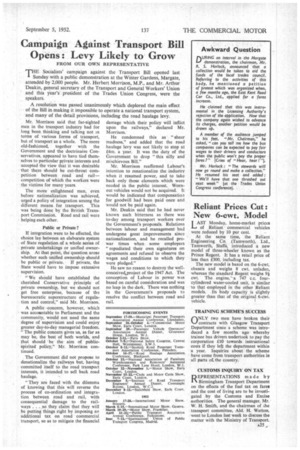Campaign Against -Transport Bill Opens : Levy Likely to Grow
Page 27

If you've noticed an error in this article please click here to report it so we can fix it.
FROM OUR OWN REPRESENTATIVE
'THE Socialists' campaign against the Transport Bill opened last I Sunday with a public demonstration at the Winter Gardens, Margate, attended by 2,000 people. Mr. Herbert Morrison, M.P., and Mr. Arthur Deakin, general secretary of the Transport and General Workers' Union and this year's president of the Trades Union Congress, were the speakers.
A resolution was passed unanimously which deplored the main effect of the Bill in making it impossible to operate a national transport system, and many of the detail provisions, including the road haulage levy.
Mr. Morrison said that far-sighted men in the transport industry had for long been thinking and talking not in terms of various forms of transport, but of transport as a whole. The more old-fashioned, together with the Government and the doctrinaire Conservatives, appeared to have tied themselves to particular private interests and accepted the view that it was desirable that there should be cut-throat competition between road and rail— competition of which the workers were the victims for many years.
The more enlightened men, even before nationalization was achieved, urged a policy of integration among the different means for transport. This was being done by the British Transport Commission. Road and rail were helping each other.
Public or Private?
If integration were to be effected, the choice lay between an elaborate system of State regulation of a whole series of private undertakings or unified ownership. At that point, the question arose whether such unified ownership should be public or private. If private, the State would have to impose extensive supervision.
"We should have established the cherished Conservative principle of private ownership, but we should not get free enterprise, because of th-: bureaucratic superstructure of regulation and control," said Mr. Morrison.
A public --concern, however, which • was accosintable to Parliament and the community, would not need the same degree of supervision and could enjoy greater day-to-day managerial freedom. "The public concern gives us, as far as may be, the best of both worlds, and that should be the aim of publicspirited policy," Mr. Morrison continued.
The Government did not propose to denationalize the railways but, having committed itself to the road transport interests, it intended to sell back road haulage.
"They are faced with the dilemma of knowing that this will reverse the process of co-ordination and integration between road and rail, with consequential damage to the railways . . . so they claim that they will be putting things right by imposing an additional tax on road commercial transport, so as to mitigate the financial damage which their policy will inflict upon the railways," declared Mr. Morrison.
He condemned this as "sheer madness," and added that the road haulage levy was not likely to stop at Pim. a year. It was the duty of the Government to drop "this silly and mischievous Bill."
Mr. Morrison reaffirmed Labour's intention to renationalize the industry when it resumed power, and to take back only those elements which were needed in the public interest. Wornout vehicles would not be acquired. It would be indicated that compensation for goodwill had been paid once and would not be paid again.
Mr. Deakin said that he had never known such bitterness as there was to-day among transport workers over the Government's proposals. Relations between labour and management had undergone great improvements sinct..nationalization, and he recalled prewar times when some employers "repudiated their own signatures on agreements and refused to observe the wages and conditions to which they were pledged."
He saw no reason to destroy the wellconceived.project of the 1947 Act. The conception of Labour in power was based on careful consideration and was no leap in the dark. There was nothing in the Government's proposals to resolve the conflict between road and rail.
















































































